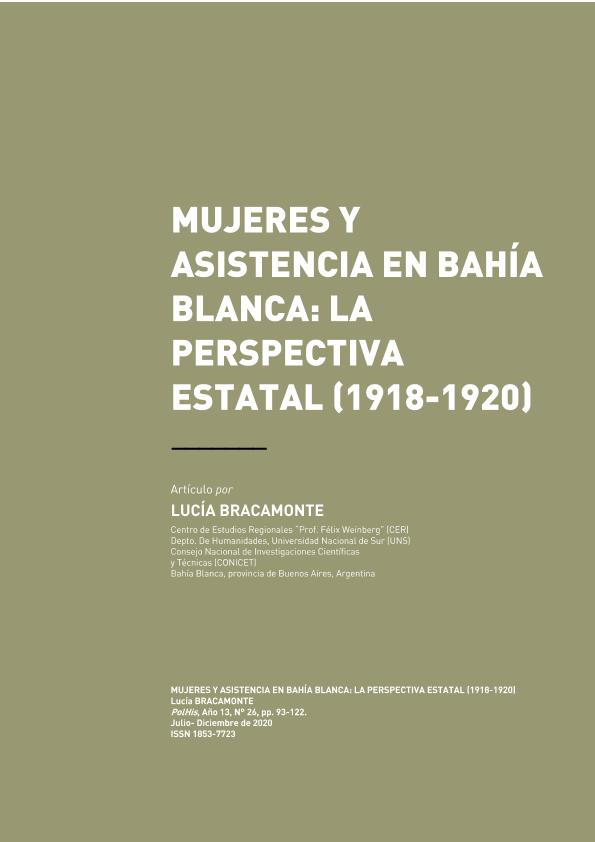Mostrar el registro sencillo del ítem
dc.contributor.author
Bracamonte, Lucia

dc.date.available
2021-11-01T15:23:32Z
dc.date.issued
2020-11-05
dc.identifier.citation
Bracamonte, Lucia; Mujeres y asistencia en Bahía Blanca: la perspectiva estatal (1918-1920); Programa Interuniversitario de Historia Política; PolHis; 26; 13; 5-11-2020; 93-122
dc.identifier.uri
http://hdl.handle.net/11336/145608
dc.description.abstract
Durante la Primera Guerra Mundial y la inmediata posguerra, se registró un aumento de las demandas al Estado para que interviniera en auxilio de los grupos más afectados por la crisis económica. En Bahía Blanca fueron la prensa, las asociaciones benéficas, personas pobres y algunos actores gubernamentales quienes las encarnaron. En este artículo se analiza la creación del Patronato de Menores en 1918 y de la Sociedad Tutelar Rivadavia en 1920, a fin de identificar qué lugar se les otorgó a las benefactoras en esos procesos de formalización oficial y cómo se redefinió el rol social del Estado. La intención de incrementar la presencia, la centralización y el control estatal en el área asistencial no implicó una declinación de las asociaciones e instituciones privadas; es más, esa intervención se planteó en gran parte a través de mujeres filantrópicas y caritativas, aunque involucrándolas de manera subordinada.
dc.description.abstract
During the First World War and the immediate postwar time, there was an increase in the demand to the State for intervening in help of the more affected by the economic crisis. In Bahía Blanca, the press, charity associations, poor persons and some government actors who embodied them. In this paper the creation of the "Patronato de Menores" in 1918 and the "Sociedad Tutelar Rivadavia" in 1920 are analyzed in order to identify what role was given to women benefactors in this official formal process and how the social role of the State was redefined. The purpose of increasing the participation, centralization and state control in the assistance area did not imply a decrease in private associations and institutions; furthermore, this intervention was raised largely through philanthropic and charitable women, although involving them in a subordinate way.
dc.format
application/pdf
dc.language.iso
spa
dc.publisher
Programa Interuniversitario de Historia Política
dc.rights
info:eu-repo/semantics/openAccess
dc.rights.uri
https://creativecommons.org/licenses/by-nc-sa/2.5/ar/
dc.subject
POBREZA
dc.subject
INFANCIA
dc.subject
ESTADO
dc.subject
BENEFICENCIA PÚBLICA
dc.subject
FEMINEIDAD
dc.subject.classification
Historia

dc.subject.classification
Historia y Arqueología

dc.subject.classification
HUMANIDADES

dc.title
Mujeres y asistencia en Bahía Blanca: la perspectiva estatal (1918-1920)
dc.title
Women and assistance in Bahía Blanca: the state perspective (1918-1920)
dc.type
info:eu-repo/semantics/article
dc.type
info:ar-repo/semantics/artículo
dc.type
info:eu-repo/semantics/publishedVersion
dc.date.updated
2021-10-18T15:43:42Z
dc.identifier.eissn
1853-7723
dc.journal.volume
26
dc.journal.number
13
dc.journal.pagination
93-122
dc.journal.pais
Argentina

dc.description.fil
Fil: Bracamonte, Lucia. Consejo Nacional de Investigaciones Científicas y Técnicas. Centro Científico Tecnológico Conicet - Bahía Blanca; Argentina. Universidad Nacional del Sur. Departamento de Humanidades. Centro de Estudios Regionales; Argentina
dc.journal.title
PolHis
dc.relation.alternativeid
info:eu-repo/semantics/altIdentifier/url/https://polhis.com.ar/index.php/polhis/article/view/14
Archivos asociados
